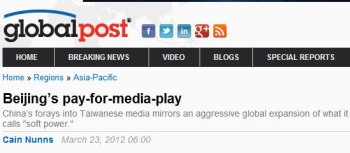
The New York Times and Global Post reported that paying for positive coverage is a practice in China and Taiwan respectively.
The practice of paying Chinese media outlets for positive coverage was highlighted by the New York Times earlier this month. According to the New York Times, if you shell out “about $20,000 a page” you could get a “profile of your chief executive to appear in the Chinese version of Esquire… according to the advertising department of the magazine.”
The problem is readers don’t know that money got the profile in the magazine, the Times explained.
iMediaEthics notes that the ethical issue isn’t paying for advertising space: it’s buying coverage – either directly or in kind – and not disclosing it to readers. With advertisements, the money typically would go to the advertisement department, but the Times’ and the Taipei Times describe direct payments to newsrooms without any disclosure. Without disclosures of the financial relationship, readers are deceived.
Further, The New York Times noted that under Chinese law, journalists aren’t allowed to exchange money for coverage, but still claimed that paying for articles is “widespread.” The Times added that “Not all business and company profiles in Chinese media are planted and paid for, of course.”
The payments aren’t just unethical in journalism standards – they may also be illegal in some cases, according to the Times. The Times cited Chinese lawyer Lesli Ligorner’s comment that “Journalists are considered government officials because generally all the press is government-controlled in China,” and explained the broader implications:
“If American multinationals made off-the-books payments directly to Chinese reporters, editors or producers, rather than simply buying space or air time through media agencies, the American companies could be at risk of violating the United States Foreign Corrupt Practices Act. The law prohibits people working for American companies that operate abroad from paying bribes or making corrupt payments to foreign officials to obtain or keep business or obtain other business advantages.”
The Times reported that companies or their PR agencies will either pay for coverage, pay for travel, or “take out advertising packages in exchange for coverage” in news outlets in China, “Europe, Japan, the Philippines, Latin America and even the United States.” As example, the Times cited Moët Hennessy’s footing the bill for journalists to “visit Moët Hennessy’s chateau in western China.” Following the trip, Chinese newspaper 21st Century Business Herald, which according to the Times had a journalist on the trip, later interviewed the company’s chief executive.
We have written to 21st Century Business Herald seeking comment on the Times’ report and will update with any response.
The Global Post reported that the “pay-for-media-play” extends to Taiwan as well. “According to The Foundation for the Advancement of Media Excellence (FAME), the island’s five largest daily newspapers printed hundreds of stories that were directly paid for by the Chinese government in the run-up to January’s presidential election,” Global Post reported.
The Taipei Times also wrote about this report, and noted that the fact that the news stories are paid for isn’t disclosed to readers. Further, the Taipai Times noted that the FAME report noted there were “Taiwan’s five biggest local newspapers published a total of 1,349 government advertisements in the second half of last year.”
We’ve previously written about paid news – or advertorials – in India’s media. India’s Press Council has issued guidance on the practice of paid news, which it described as “old, complex, and deep rooted in the system,” and noted that its 2010 investigation of paid news at the “big newspaper houses” in India determined that “many” published paid news.
UPDATE: 4/26/2012 8:00 AM EST: added information





